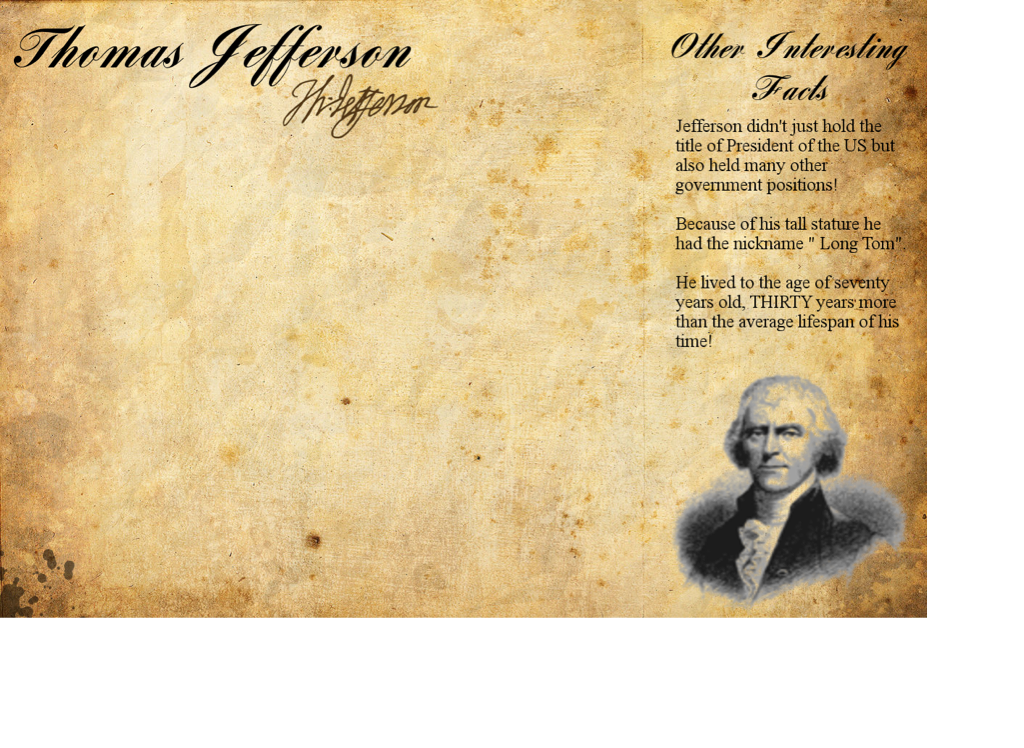Sign up for FlowVella
Sign up with FacebookAlready have an account? Sign in now
By registering you are agreeing to our
Terms of Service
Loading Flow


® A&J Inc. CONFIDENTIAL - Do Not Distribute
Jefferson was born April 13, 1743 at the Shadwell Plantation just outside Charlottesville, Virginia. All of Jefferson's memories here, were the base for a truly extraordinary man. During his time here, he attended a private school ran by reverend William Douglas! Amazing! He then, at the meek age of 14, began an education with reverend John Maury, and not long afterwards, he attended the College of William and Mary, which was, and is, the second oldest college in America! Truly one with a high enough mental capability in order to be educated with such quickness deserves the title of "The Best Man of the Enlightenment Era". Once he had finished his time at William and Mary, he studied law. At the time, however, there were no law schools, men instead were expected to read law under the supervision of an already established lawyer.
Once he had became an official lawyer, he had earned great success from it. He became well known, and won the majority of his cases. Not only did he accomplish this during his time of law, but a woman named Martha Wayles Skelton had stolen his heart. The pair married January 1, 1772.
His career in law, not to mention the struggle for American Independence at the time, had of course gotten him interested in politics. He was one of the earliest and fervent supporters of the idea of American Indepence. The House of Burgesses elected him in 1768, and he joined the Radical Bloc, which was led by George Washington and Patrick Henry.
In the year 1774, Jefferson wrote his first major political work, "A Summary View of the Rights of British America". This established his reputation as one of the most frequent advocates of the cause for American Independence. A year later, he joined the Second Continental Congress which had created the Continental Army, and chose fellow Virginian, George Washington as its commander-in-chief. The Congress' best work, however came from Jefferson himself.
June, 1776, congress chose a five-man committee to draft the Declaration of Independence. The committee then chose Jefferson to pen the first draft. During the next 17 days, Jefferson wrote one of the most beautiful representations of freedom in history. The document contained details in beautiful wondering about basic human rights, and the pursuit of happiness, and numerous grievances toward King George III.
Although the Declaration of Independence that had been adopted July 4, 1776, had undergone many revisions after Jefferson wrote the original draft, these words will still be forever, "We hold these truths to be self-evident, that all men are created equal, that they are endowed by their Creator with certain unalienable rights; that among these are Life, Liberty, and the pursuit of Happiness."
After penning the Declaration of Independence, Jefferson returned to Virginia in 1776, and remained there for three years, serving as a member of the Virginia House of Delegates. Whilst there, he wished to revise Virginia's laws to fit the ideals of American Independence he had written in the Declaration of Independence. He revised a few laws, and even completely got rid of the doctrine of entail.
He then, as another service to citizens, wrote the Virginia Statute for Religious Freedom. This established religious freedom and separated the church from the state.
Following these events, Jefferson became governor of Virginia, then Minister to France & Secretary of State, Vice President, and finally the third president of the United States of America. His first term in office was extremely successful. Making sure to keep with his republican values, Jefferson removed all presidential restraints of European royalty, had the size of the armed forces and government bureaucracy reduced, and lowered the national debt from $80 million to $57 million in his first two years. His largest achievements, however, involved assertions of national government power and amazingly liberal readings of the constitution. Jefferson had also ridden the centuries old problem of barbarians getting in the way of American shipping in the Mediterranean. After these years in office, he was of course voted for again, where he again made many achievements.
Jefferson passed away on July 4, 1826; this was the 50th anniversary of the Declaration of Independence. John Adams had passed away the same day, just a few hours before Jefferson did, and his last words were, "Thomas Jefferson Survives."